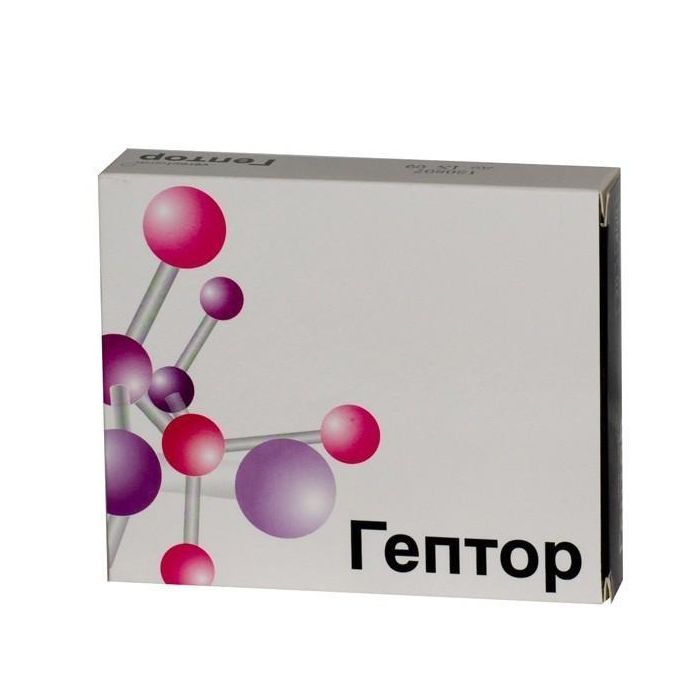ademethionine | Heptor lyoph. d / r v / v, v / m vv. 400 mg vials per set with r-ampoules of 5 ml of 5 pieces.
Special Price
$67
Regular Price
$78
In stock
SKU
BID517969
Release form
Lyophilisate for solution for intravenous and intramuscular administration
Lyophilisate for solution for intravenous and intramuscular administration
Release form
Lyophilisate for solution for intravenous and intramuscular administration
Packaging
5 vials complete with solvent.
The pharmacological action of
heptor belongs to the group of hepatoprotectors, It has antidepressant activity, detoxifying, regenerating, antioxidant, anti-fibrosing and neuroprotective effects.
Ademethionine is involved in the biochemical processes of the body, while stimulating the production of endogenous ademethionine. Ademethionine (S-adenosyl-L-methionine) is a biological substance that is found in all tissues and body fluids. Its molecule is included in most biological reactions both as a methyl group donor - methylation of phospholipids in the lipid layer of the cell membrane (transmethylation), and as a precursor of physiological thiol compounds - cysteine, taurine, glutathione, one of the most important intracellular antitoxic agents, CoA, etc. (trans sulfation), and as a precursor of polyamines - putrescine, stimulating cell regeneration and proliferation of hepatocytes, spermidine, spermine, which are part of the structure of ribosomes (aminopropylation).
Indications
intrahepatic cholestasis
hepatitis of various origins: toxic (including alcoholic), viral, medicinal (antibiotics, antitumor, antituberculosis and antiviral drugs, tricyclic antidepressants, oral contraceptives)
precirrotic states
cirrhosis of the liver
encephalopathy of secondary origin
depressive syndromes, including secondary
alcohol withdrawal syndrome.
Contraindications
Children's age.
Hypersensitivity to the drug.
Use during pregnancy and lactation
Heptor is not recommended for use in the I-II trimester of pregnancy and during breastfeeding.
Special instructions
Given the tonic effect of heptor, the drug is not recommended before bedtime.
A heptor tablet should be removed from the package immediately before use.
Use in cases of impaired liver function
When prescribing heptor for patients with cirrhosis of the liver amid hyperazotemia, systematic monitoring of blood nitrogen levels is necessary.
Composition
Active ingredient:
ademethionine 1,4-butanedisulfonate 760 mg, which corresponds to the content of ademethionine 400 mg
Solvent:
L-lysine (in the form of monohydrate) - 68.48 mg,
sodium hydroxide 8.
water d / i - up to 1 ml
Dosage and administration of
Intramuscularly or intravenously (intensive care):
Heptor is prescribed 400-800 mg per day in 5-10 ml of solution for the first 2-3 weeks.
Intravenously should be administered very slowly.
Powder for injection is dissolved only in the special solvent supplied (L-lysine solution) immediately before use.
Side effects of
Due to the fact that the active substance of the drug has an acidic pH, some patients may experience discomfort in the epigastric region when using heptor.
In any case, these feelings are short-lived, are not pronounced and should not serve as a reason for stopping the course of treatment.
Storage conditions
In a dry, dark place at a temperature of no higher than 25 РC.
Keep out of the reach of children.
Deystvuyuschee substances
Ademetyonyn
Terms of dispatch from
pharmacies Prescription
Lyophilisate for solution for intravenous and intramuscular administration
Packaging
5 vials complete with solvent.
The pharmacological action of
heptor belongs to the group of hepatoprotectors, It has antidepressant activity, detoxifying, regenerating, antioxidant, anti-fibrosing and neuroprotective effects.
Ademethionine is involved in the biochemical processes of the body, while stimulating the production of endogenous ademethionine. Ademethionine (S-adenosyl-L-methionine) is a biological substance that is found in all tissues and body fluids. Its molecule is included in most biological reactions both as a methyl group donor - methylation of phospholipids in the lipid layer of the cell membrane (transmethylation), and as a precursor of physiological thiol compounds - cysteine, taurine, glutathione, one of the most important intracellular antitoxic agents, CoA, etc. (trans sulfation), and as a precursor of polyamines - putrescine, stimulating cell regeneration and proliferation of hepatocytes, spermidine, spermine, which are part of the structure of ribosomes (aminopropylation).
Indications
intrahepatic cholestasis
hepatitis of various origins: toxic (including alcoholic), viral, medicinal (antibiotics, antitumor, antituberculosis and antiviral drugs, tricyclic antidepressants, oral contraceptives)
precirrotic states
cirrhosis of the liver
encephalopathy of secondary origin
depressive syndromes, including secondary
alcohol withdrawal syndrome.
Contraindications
Children's age.
Hypersensitivity to the drug.
Use during pregnancy and lactation
Heptor is not recommended for use in the I-II trimester of pregnancy and during breastfeeding.
Special instructions
Given the tonic effect of heptor, the drug is not recommended before bedtime.
A heptor tablet should be removed from the package immediately before use.
Use in cases of impaired liver function
When prescribing heptor for patients with cirrhosis of the liver amid hyperazotemia, systematic monitoring of blood nitrogen levels is necessary.
Composition
Active ingredient:
ademethionine 1,4-butanedisulfonate 760 mg, which corresponds to the content of ademethionine 400 mg
Solvent:
L-lysine (in the form of monohydrate) - 68.48 mg,
sodium hydroxide 8.
water d / i - up to 1 ml
Dosage and administration of
Intramuscularly or intravenously (intensive care):
Heptor is prescribed 400-800 mg per day in 5-10 ml of solution for the first 2-3 weeks.
Intravenously should be administered very slowly.
Powder for injection is dissolved only in the special solvent supplied (L-lysine solution) immediately before use.
Side effects of
Due to the fact that the active substance of the drug has an acidic pH, some patients may experience discomfort in the epigastric region when using heptor.
In any case, these feelings are short-lived, are not pronounced and should not serve as a reason for stopping the course of treatment.
Storage conditions
In a dry, dark place at a temperature of no higher than 25 РC.
Keep out of the reach of children.
Deystvuyuschee substances
Ademetyonyn
Terms of dispatch from
pharmacies Prescription
Submit your review to Earn 10 Reward Points click here to login
Write Your Own Review

